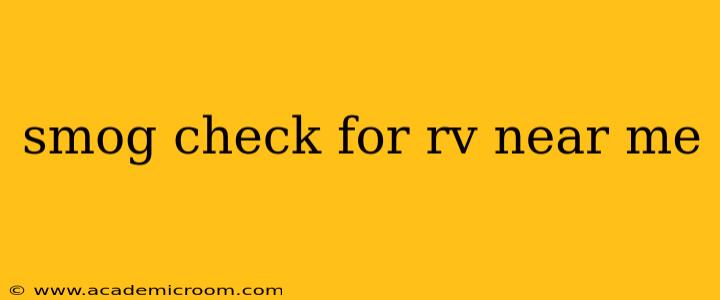Finding a reliable smog check station for your RV can feel like navigating a maze. Unlike your car, RVs often require specialized attention due to their size and unique emission systems. This guide helps you locate a suitable facility and understand the process.
What is an RV Smog Check?
An RV smog check, or emissions test, measures the pollutants your recreational vehicle releases into the atmosphere. The specific requirements vary by state and sometimes even by county. The test assesses the levels of harmful gases like carbon monoxide (CO), hydrocarbons (HC), and nitrogen oxides (NOx) emitted from your RV's engine. Passing the test ensures your RV meets the environmental regulations in your area. Failure to pass can result in fines or prevent you from registering your RV.
How Often Do RVs Need Smog Checks?
The frequency of RV smog checks depends entirely on your location and the age and type of your RV. Some states might require annual inspections, while others might have different schedules based on the vehicle's age or fuel type. Check with your local Department of Motor Vehicles (DMV) or equivalent agency for the exact regulations in your area. This is crucial information you need before scheduling your test.
Where can I find the smog check requirements for my state?
Finding this information is simple. A quick online search for "[Your State] RV smog check requirements" will direct you to the relevant government website or agency. Look for official documentation rather than relying on forums or unofficial sources. The specific website may differ depending on your state (e.g., DMV, Department of Environmental Quality, etc.).
Finding an RV Smog Check Near Me: Practical Tips
Locating a suitable smog check facility for your RV requires a strategic approach. Don't just rely on general search results. Here's a refined strategy:
- Search Engines: Use precise search terms like "RV smog check near me," "large vehicle emissions testing [your city/zip code]", or "diesel RV smog check [your city/zip code]" (if applicable). This helps filter results to facilities equipped to handle RVs.
- RV Dealerships and Repair Shops: Contact local RV dealerships or repair shops. They often have connections to or recommendations for nearby smog check centers that cater to large vehicles.
- State DMV Website: Many state DMV websites maintain lists of certified emissions testing stations. This is a highly reliable resource.
- Online Directories: Websites and apps specializing in vehicle services (e.g., Yelp, Google Maps) can help you find and compare nearby smog check stations. Check reviews to gauge the quality of service and expertise.
What to Expect During an RV Smog Check
The specific procedures vary, but generally expect the following:
- Vehicle Inspection: The technician will visually inspect your RV's engine and emission system.
- Emissions Test: Your RV will be connected to specialized equipment that measures its emissions. You may need to run the engine for a specific period.
- Documentation: Upon completion, you will receive documentation confirming whether your RV passed or failed the inspection. If failed, you will usually get details on the issues to address.
What if my RV fails the smog check?
If your RV fails the smog check, don't panic. The report will detail the reasons for failure. This could involve issues with the engine, exhaust system, or other emission-related components. You'll need to have the necessary repairs done by a qualified mechanic and then schedule a retest.
How much does an RV smog check cost?
The cost varies significantly based on your location and the complexity of your RV's emission system. It's best to contact potential facilities directly to obtain pricing information.
By following these steps and understanding the process, finding the right RV smog check near you will be significantly easier. Remember to always verify the facility's certifications and read online reviews before scheduling your appointment.
